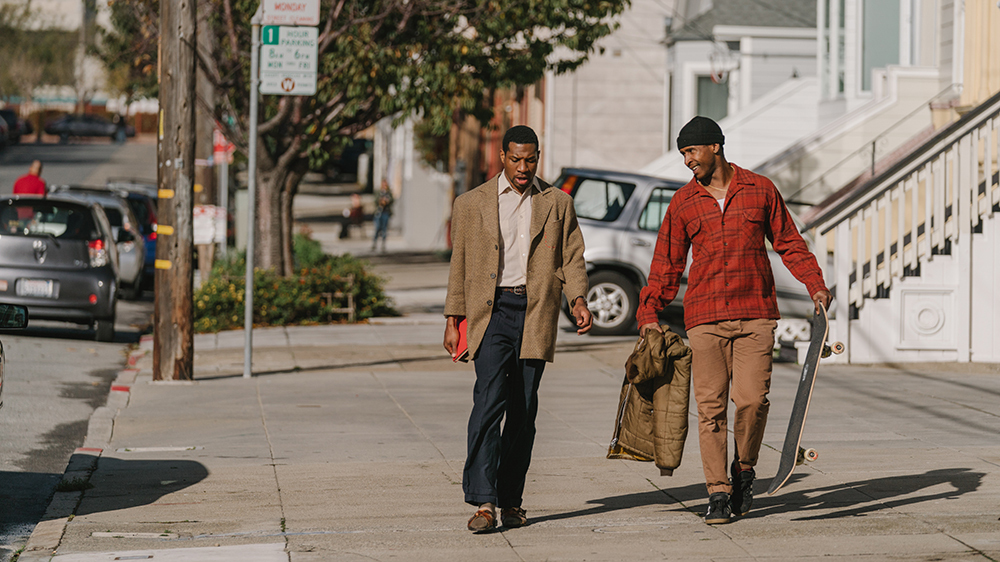
THE LAST BLACK MAN IN SAN FRANCISCO
A24
Reviewed for Shockya.com & BigAppleReviews.net linked from Rotten Tomatoes by: Harvey Karten
Director: Joe Talbot
Screenwriter: Joe Talbot, Rob Richert, story by Jonathan Majors, Joe Talbot
Cast: Jimmie Fails, Jonathan Majors, Rob Morgan, Tichina Arnold, Mike Epps, Finn Wittrock, Danny Glover, Willie Hen, Jamal Truvole
Screened at: Dolby88, NYC, 6/3/19
Opens: June 7, 2019
In Alfred Hitchcock’s “Vertigo,” one of the many movies taking place in San Francisco, Gavin Elster complains to retired police detective Scottie Ferguson, that the city is not what it used to be. This becomes the theme of Joe Talbot’s “The Last Black Man in San Francisco, an ode to one of America’s most touristic metropolises, one of our few cities that do not require residents to get about by car. Nostalgia-minded people might well lament that its history of being sanctuaries for African-Americans who left the oppressive South and immigrants who fled from political and economic countries has become an ultra-expensive playground for the rich and upcoming tech executives settling into its gentrified homes. In his debut feature, fifth-generation San Franciscan Joe Talbot makes use of his long-term friendship with Jimmie Fails to create a heart-rending film of marginalized people, cast aside by the “progressive” changes in residential quarters, but who have never forgotten their cherished childhoods in the Bay area. The pic is all the more remarkable not only as Talbot’s first shot at a feature but in the range of emotions explored by its chief characters, played by Jimmie Fails and Jonathan Majors.
“The Last Black Man in San Francisco” will likely be one of this year’s few movies that are gloriously theatrical, reminding serious theatergoers of themes toyed with by the late August Wilson—whose Pittsburgh cycle of ten plays each hone in on a different decade, comic and tragic, of 20th century African-Americans. Talbot’s tale deals with the all-encompassing themes of community, friendship, and the magic of home, treating home as the refuge from an often dangerous and anarchic world, a childhood domicile which many of us today try to reclaim.
Patience is required, as that virtue often is, when a story does not immediately congeal but takes its time, skipping from place to place and character to character, making more sense only as it goes along until we in the audience realize, “Aha!” Its anchor is the friendship of Montgomery, or Mont (Jonathan Majors), an aspiring playwright and illustrator, and Jimmie Fails (Jimmy Fails), who sells fish by day even despite warnings from a well-dressed orator who opens the movie with a denunciation of the toxic waters that have changed the environment for the hapless creatures that will wind up in Monty’s retail department. Jimmie’s memories of better times decades back take on tangible form as he rides about the area on a colorful skateboard which will eventually—both metaphorically and physically—be smashed in anger. Jimmie had once lived with his father (Rob Morgan) in a Victorian house which his dad had lost because of a drug problem. He becomes obsessed with the place notwithstanding its occupancy by an elderly couple, shown dramatically when he undergoes repairs, painting the outside as though he were still living there (not unlike Charlie Peck in Deon Taylor’s “The Intruder”). Rob Richert’s script, co-written with the director and with a story created in part by actor Jonathan Majors, tells briefly over its occupancy by Japanese who were expelled during World War 2 and sent infamously to camps.
When an elderly couple move out, Jimmie moves in as a squatter and is joined by his friend Mont, who has been taking care of his blind grandfather (Danny Glover). Among the humorous experiences is their sighting of a tour group on Segways whose tour guide (Jello Biafra) tells his patrons that the house was built in 1856, that idea disputed (as it is several times during the story) by Jimmie, who insists that his grandfather built it in 1946. Being theatrical, the film brings in a Greek chorus, if you will, of local, thuggish people who razz Jimmie and Mont mercilessly but are not people who will expect to carry out violence.
Jimmie’s “Abbott” plays vividly against his foil Mont’s “Costello,” so to speak, and together with hearty doses of humor at unexpected turns keep the movie moving through its solid two hours with nary a moment of listlessness. It helps greatly that the solid ensemble acting is punctuated by Emile Mosseri’s score, photographed by Adam Newport-Berra in a San Francisco neighborhood that would be familiar only to its residents. Like Jimmie, many of us crave a feeling of continuity with our childhoods. Given his rich friendship with Mont and his strong determination to recover a sense of belonging, Jimmie Fails gives us in the audience a resonant feeling of sympathy with his character and by extension with the ensemble of African-Americans who have become marginalized by a technocratic order.
120 minutes. © 2019 by Harvey Karten, Member, New York Film Critics Online
Story – B+
Acting – B-
Technical – A-
Overall – B+





